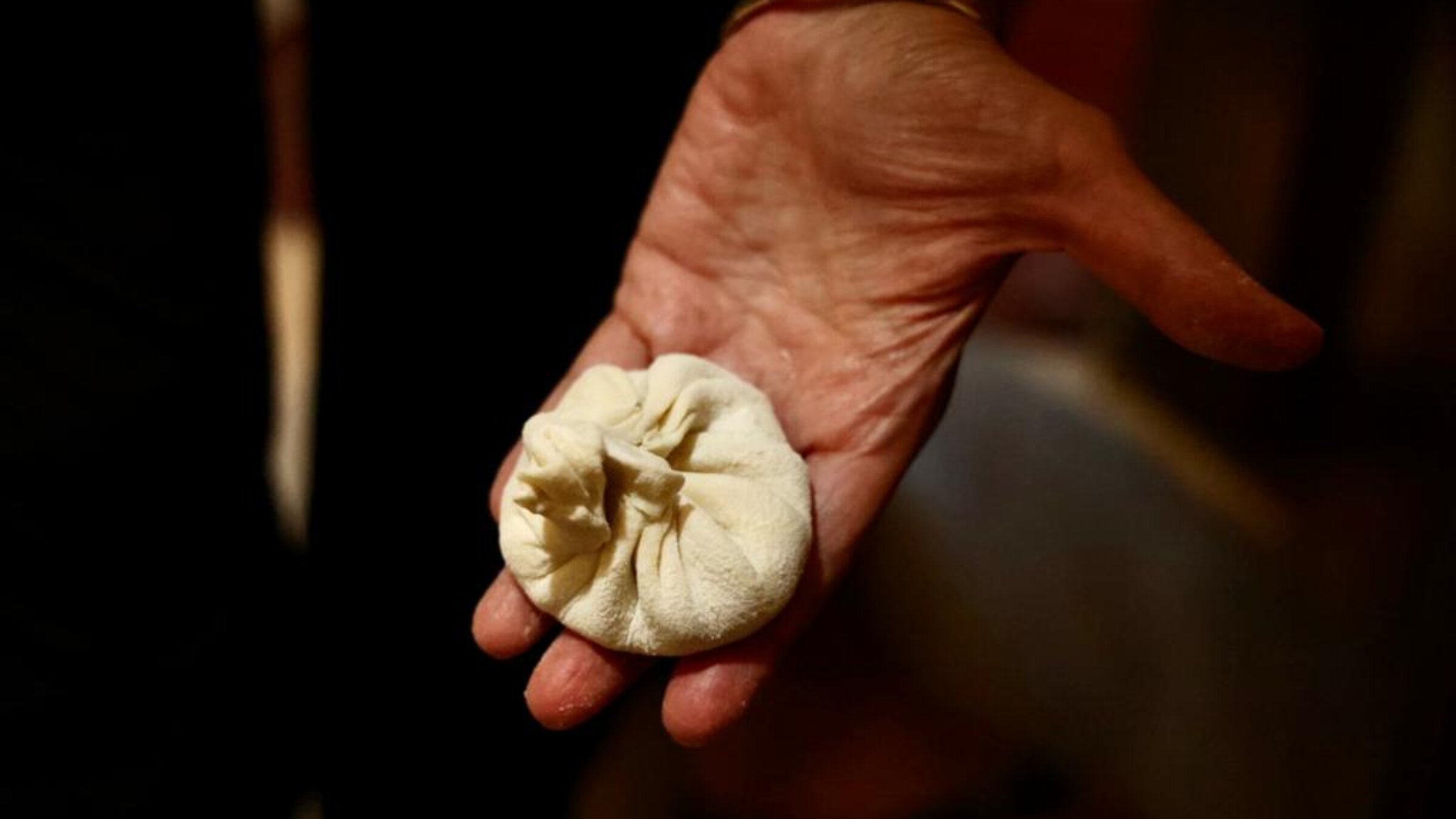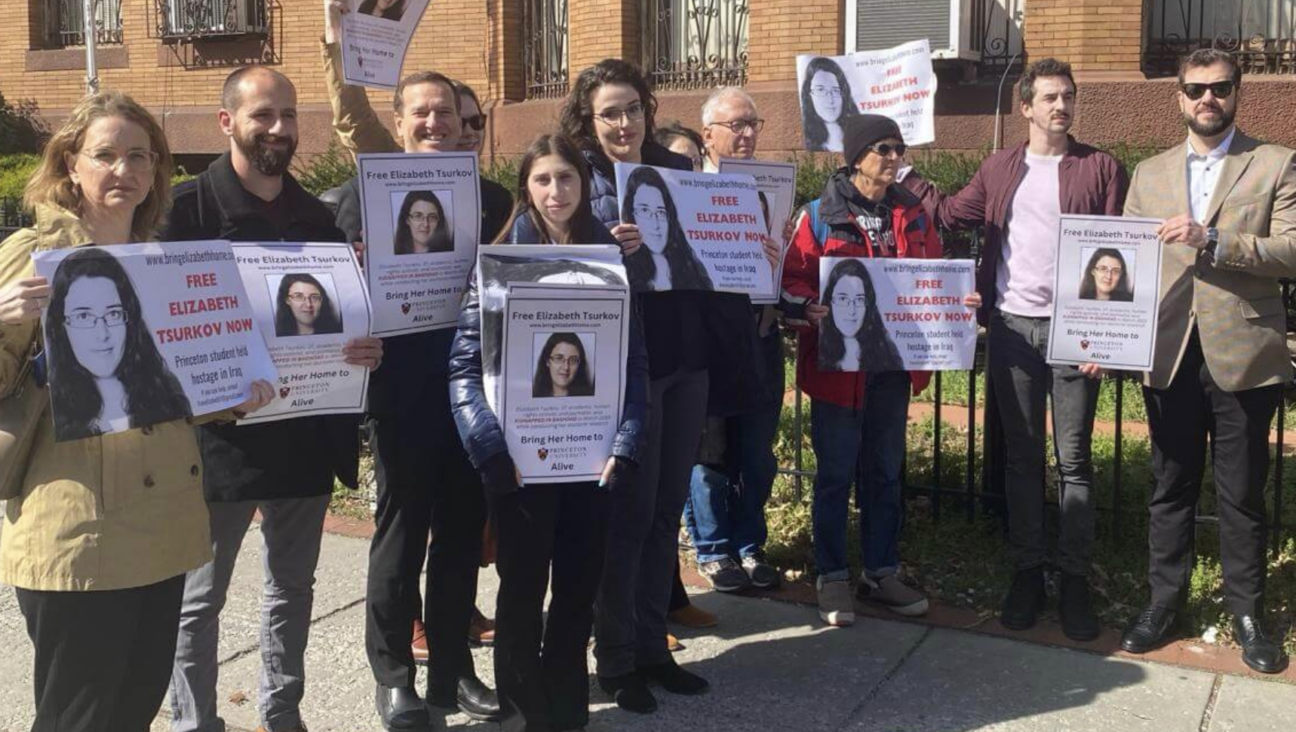This is our editor-in-chief’s weekly newsletter. Click here to get it delivered to your inbox on Friday afternoons. We walked into the kitchen for our impromptu cooking lesson to find a little girl asleep on the divan. The kitchen in question was a cramped galley on the eighth floor in a Soviet-built apartment block in Tbilisi, Georgia that had a coin-operated elevator. There were six of us; no way we could cram into that kitchen without sitting on that sofa. And it was hot.
Our host, Davit Varduashvili, ignored the fact that we were quite obviously disrupting the nap of his 5-year-old daughter, Nita, and delaying dinner for his very pregnant wife. Sweating through his yellow tank top, Davit poured us homemade wine from a re-used Coke bottle, and juggled utensils and ingredients, ignoring the awkwardness. “We had a lot of guests at home,” Davit said later, recalling how his dad worked at a factory and invited his comrades over for dinners when he was a kid. “My parents were teaching me hospitality. My mother always told me, if you have two apples — one small one, one big — give big one to your guests. You will find another one in your garden.” |
(Photographs by Eli Deush Lrogmann) |
Davit is not a cooking teacher, nor a professional chef. He works as a tour guide, though I met him at church; he is an active member of Tblisi’s Peace Cathedral, part of the tiny, leftist Evangelical Baptist Church of Georgia. I went to Tbilisi in late May with a group from my New Jersey synagogue for an interfaith immersion involving the world’s first church, mosque and synagogue under a single roof. (You can read a whole lot more about that here.) At the feasts following our Shabbat services and Sunday’s Pentecost worship, Davit, 35, was the guy serving the homemade soups (mushroom one day, sour yogurt the next). I’m always interested in the guy who makes the soup. I, too, have been known to make soup. And for a while before the pandemic, I ran a little pop-up brunch cafe at our shul, Temple Ner Tamid in Bloomfield, N.J. So I wanted to get the backstory on how the church-cooking worked — and, also, learn to make the adorable and delectable little envelopes of eggplant wrapped around a garlicky walnut spread that were on the buffet. Davit, whose family converted from Orthodox Christianity to Evangelical Baptism when he was 9, spent two years working as a driver for Bishop Malkhaz Songulashvili, the eccentric leader of the Peace Cathedral, who does not have a license. When the bishop turned 60 in February, Davit volunteered to cater the supra, a Georgian feast. It was a hit, and when the bishop needed someone to organize the food for our visit, he turned to Davit. Soup is his favorite thing to make. His mother taught him when he was in university — he majored in Georgian history — and living alone for the first time. “She said it’s so easy: If you have two liters of water, put 100 grams of rice, some carrots, potato, boil it 20 minutes, it is soup,” he recalled. “But I added half kilo of rice. It was incredible — I added water, I added water, there was no space in pot.” After that, when his mother shared cooking tips, Davit said, “I started writing it down.” Davit seemed a bit taken aback when I suggested coming to his house to cook dinner with him. Then he said I could bring up to five fellow travelers. Our first surprise was seeing him deposit 20 tetri, a coin worth about 8 cents, into the elevator to make it go. You have to pay to get to your own apartment? “We have another small one,” he said sheepishly. “It’s free from down to up, but up to down it’s 10 tetri.” This was going to be interesting. |
“My mother always told me, if you have two apples — one small one, one big — give big one to your guests. You will find another one in your garden.” |
– Davit Arduashvili, Georgian tour guide (and cook) |
Davit had done what he could on short notice and in cramped quarters to mimic a real cooking class. He’d pan-fried most of the thin strips of eggplant we needed for those little envelopes in a bit of sunflower oil, but left a few to show us how to shake off the excess water — run each piece between two fingers, over the sink. He had prepped the walnuts — in a meat grinder, not a food processor, the textural secret to several Georgian specialties — but held off adding the boiling water and spices until we arrived. Alas, like many home cooks, Davit does not use exact recipes. For two kilos of eggplant, he said, you need a half kilo of walnut. Add a lot of mashed garlic (his was yellowed in a tub in the fridge, obviously a staple), boiling water, vinegar (his is homemade), ground coriander, turmeric, red pepper (“necessary, red pepper,” he said), and . a big spoonful of a spice mix whose contents he could not name. We sniffed it. We put a dab on a finger and tasted it. Cumin? Curry powder? “If you are intending to buy,” he offered, “we can go together to the market.” (If you are intending to write a column, I thought to myself, look for a recipe online; this one, which rolls the eggplant rather than folding it, suggests the mystery spice might have been fenugreek.) I’d come for the eggplant envelopes — Badrijani Nigvzit, according to the online recipes — and they were delicious; I will be making them for Rosh Hashanah, complete with pomegranate-seed garnish. But what Davit really loves to make is khinkali, Georgian dumplings. He spent two years making nothing but khinkali at a hotel restaurant in Tusheti, a town on the Caucasus Mountains near the border with Chechnya. For the dough, he said, mix a kilo of flour with around 150 grams of water and a tablespoon of salt. “You need to make hard dough, pressing and pressing” for about four minutes, Davit said, then put it in a plastic bag in the fridge for at least 30 minutes. “You make hard dough, and after half hour, it is soft.” Davit, who started his touring business in 2014, grew up on a hog farm in Ozhio, a village not far from Tusheti, and has a freezer full of pork, his preferred filling; you can easily use ground beef or turkey. Add a cup of water and a spoonful of salt per half kilo of meat, and whatever other spices you want. He also filled some with mushrooms and others with cheese. The key, of course, is having the right ratio of filling to dough and pinching them so they stay closed as they cook, and look pretty. (Consult any number of YouTube videos.) Davit salted the boiling water heavily before plopping them into the pot; when they were about done, he had me dump a bunch of cold water on top of the boiling pot, to rinse the salt off. Neat trick. (I could eat these dumplings every week, though I’ve not yet been brave enough to try making them at home. Stay tuned.) |
Finally, we sat — the six of us travelers, all women; Davit and his wife, Mari, who is due in October; Nita and her 3-year-old sister, Anna. You start with khinkali, David schooled us, and you must eat them without utensils. Washed down not with wine but with chacha, a Georgian brandy distilled from the leftovers of winemaking that is 50% alcohol. Davit makes his own, and always has a bottle or three in his car, offering early morning shots to tourists before a big hike as well as their flights home. In his living room, where a “Home Sweet Home” cross-stitch made by an American client hangs on the wall, he gave each of us a generous pour from a Gordon’s gin bottle. We had already learned the Georgian word “Gaumarjos!” which means “Victory to you!” and is generally said after a toast — like “L’chaim.” (Georgians are big on toasts; at every supra, someone is dubbed toastmaster, which means they stand up randomly and repeatedly throughout the meal to offer stemwinding tributes to host, guest, God, country and whatever else moves them.) Now Davit taught us a new word, “Bolomde!,” to be proclaimed with each shot of chacha. Bottoms up! |
Thanks to Matthew Litman for contributing to this newsletter, and for all his excellent work as an editorial fellow over the past year. Today is his last day at the Forward. We miss you already, Matt! Shabbat Shalom! Questions/feedback: [email protected] |
|
|
Meet the guys curating some of the most engaging conversations about Judaism on the Internet: the volunteer moderators of Reddit’s main Judaism channel. They were guests on That Jewish News Show, where Benyamin and Laura also talked about the Tree of Life trial and how the demise of Saturday sports pages hurts Orthodox Jews. |
|
|
The Torah calls for the death penalty for 36 different crimes. The Mishnah says it should only be used once every 70 years — or never, or only as a deterrent. With the Tree of Life trial entering its final phase, to determine whether the man who killed 11 Jews during Shabbat services should face the ultimate punishment, we convened six Jewish scholars for a virtual conversation. |
Rabbis Mira Rivera, Charlie Cytron-Walker, Shais Rishon and Jeremy Kalmanofsky, Cantor Michael Zoosman and Prof. Beth Berkowitz broke down the text, talked about teshuva, debated what the ancient sages might say about wrongful convictions and collective responsibility, challenged each other and offered words of comfort to the victims’ families. |
DEPT. OF SELF-CONGRATULATION |
Our journalists won 33 Simon Rockower Awards this week from the American Jewish Press Association, including first prizes in investigative, commentary, personal essay, politics, food, arts criticism, and for coverage of antisemitism, Black-Jewish relations and young families. Plus: Andrew Silverstein, who broke the story of George Santos having lied about his Holocaust history, was named Best Freelancer. Here are a few other highlights: |
|
|
| | All Benyamin Cohen wanted after his mother died in 1989 was a time machine. But he had to miss the release of Back to the Future II, the sequel of his favorite movie, because of Jewish mourning laws. The judges praised his prizewinning personal essay about the experience as “a thoughtful and insightful piece that draws meaning from its reflections on a childhood trauma and that experience’s enduring impact.” |
|
|
| Senior columnist Rob Eshman’s work about the intersection of politics and food — exploring the ethics of synagogues serving lox and what it means for Jews to cook Palestinian dishes — won not one but two food prizes. The judges called the articles “humorous but still thoughtful” and “a nuanced examination of the possibilities and limitations of using food as a bridge between communities in conflict.” |
|
|
|











































